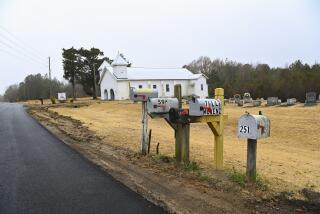COLUMN LEFT : Call a Summit for Cities, Poor Hitting Bottom : As in Eastern Europe, if people’s needs are not met they will replace their leaders.
- Share via
There have been three important summits recently. Such meetings are useful instruments. And that is why we need a new kind of summit for the people of urban and rural America.
Summits foster direct communication, break down barriers and build relationships. The Bush-Gorbachev meeting in Washington continued to reduce tensions East and West and built bridges of understanding between the Soviet and American peoples--even as Mikhail Gorbachev sought U.S. economic assistance for the ailing Soviet economy.
Then there was the NATO summit in London. With the changes taking place in the Soviet Union, and the democratic revolutions in Eastern Europe in 1989 and 1990, NATO is having to adjust its purpose and structure. It is shifting from providing stability primarily by using military might to maintaining stability through political and economic development.
Following the NATO meeting was the G-7 economic summit in Houston. The seven most industrialized nations in the world gave special attention this year to the environment, world agricultural policy and aid to the Soviet Union and China.
Bilateral and multilateral summits help focus attention on trends and critical issues. They educate leaders and the general public, and they contribute to the public debate of important issues.
In that spirit, what is most needed in the United States today is for President Bush to convene a “domestic summit.” It is needed for the same reasons that the other summits were held: At their heart, all of these conferences focused on the need for social and economic development.
In the United States, the unjust economic and bad social policies of the 1970s and 1980s appear to be cresting. The shift in wealth and income from the poor, the workers and the middle class to the rich has resulted in budget deficits, national debt, slow growth, slow job creation, high real interest rates, infrastructure collapse, non-competitiveness and more.
It has also resulted in rising poverty, malnutrition, infant mortality, homelessness, a health-care crisis, an educational crisis, hopelessness and nihilism. If these underlying causes are not addressed, drugs, crime and violence will continue to rise also. And in response, more repressive, expensive and less effective policies for combatting these ills will emerge. We will build more jails and put more people to death.
But how is this different from our fears about the Soviet Union and Eastern Europe? We fear that if the underlying social and economic development needs of the Soviet and Eastern European people are not met, repressive and autocratic leaders will return to replace the current ones. They will repress democracy, and retreat to ineffective economic policies, in order to restore order.
This year’s international summits analyzed the problems confronting them, weighed the costs of inaction and came up with a plan, a budget and a timetable for solving them. But there is no such analysis, plan, budget and timetable for the social and economic redevelopment of America--no plan for Philadelphia, New York or Chicago; for Flint, Mich., or Anderson, Ind., or for rural America.
In fact, President Bush has inflamed racial fear rather than inspired our common hope for racial justice. In the debate over the 1990 Civil Rights Act, he used the term “quota bill” to incite fear and divide the people as he used Willie Horton in his presidential campaign for the same purpose.
Why do we need a domestic summit conference? Because America needs an urban reinvestment plan, a rural redevelopment plan, and a plan to achieve gender equality and racial justice that has a budget and a timetable attached to it.
My grandmother used to tell me how everyone would stop what they were doing and huddle up close to the radio when President Franklin Delano Roosevelt would give his fireside chats. There was hope and help in his messages.
Currently, there is no such hope or help coming from the leadership in the White House. But if President Bush were to convene a domestic summit conference, inclusive of a representative and broad range of American leadership, and put forth a plan, budget and timetable for national economic and social development, the people would rise to the occasion and rally around him.
More to Read
Sign up for Essential California
The most important California stories and recommendations in your inbox every morning.
You may occasionally receive promotional content from the Los Angeles Times.













